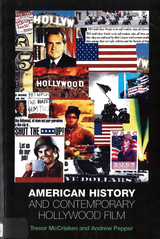
Hollywood has always been fascinated by America's past, but never more so than in the past fifteen years. Bringing exciting new perspectives to how and why Hollywood has sought to repicture American history, this book offers analysis of more than twenty mainstream contemporary films, including The Patriot, Amistad, Glory, Ride with the Devil, Cold Mountain, Saving Private Ryan, TheThin Red Line, Pearl Harbor, U-571, Platoon, Born on the Fourth of July, Heaven and Earth, JFK, Nixon, Malcolm X, Ali, Black Hawk Down, and Three Kings.
Both authoritative and engaging, American History and Contemporary Hollywood Film is the first book to comprehensively explore the post-cold war period of filmmaking, and to navigate the complex ways that film mediates history-sometimes challenging or questioning, but more frequently reaffirming traditional interpretations. The authors consider why such films are becoming increasingly integral to the ambitions of a globally focused American film industry.
Structured by historical periods, chapters cover significant events and eras such as the American Revolution, slavery and the Civil War, World War II, the sixties and seventies, civil rights and black nationalism, the Vietnam War, and post-cold war global conflicts. The lessons learned from the examples will be illuminating for general readers and college students alike.
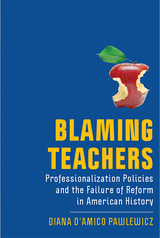
Historically, Americans of all stripes have concurred that teachers were essential to the success of the public schools and nation. However, they have also concurred that public school teachers were to blame for the failures of the schools and identified professionalization as a panacea.
In Blaming Teachers, Diana D'Amico Pawlewicz reveals that historical professionalization reforms subverted public school teachers’ professional legitimacy. Superficially, professionalism connotes authority, expertise, and status. Professionalization for teachers never unfolded this way; rather, it was a policy process fueled by blame where others identified teachers’ shortcomings. Policymakers, school leaders, and others understood professionalization measures for teachers as efficient ways to bolster the growing bureaucratic order of the public schools through regulation and standardization. Beginning in the mid-nineteenth century with the rise of municipal public school systems and reaching into the 1980s, Blaming Teachers traces the history of professionalization policies and the discourses of blame that sustained them.

The death penalty arouses our passions as does few other issues. Some view taking another person’s life as just and reasonable punishment while others see it as an inhumane and barbaric act. But the intensity of feeling that capital punishment provokes often obscures its long and varied history in this country.
Now, for the first time, we have a comprehensive history of the death penalty in the United States. Law professor Stuart Banner tells the story of how, over four centuries, dramatic changes have taken place in the ways capital punishment has been administered and experienced. In the seventeenth and eighteenth centuries, the penalty was standard for a laundry list of crimes—from adultery to murder, from arson to stealing horses. Hangings were public events, staged before audiences numbering in the thousands, attended by women and men, young and old, black and white alike. Early on, the gruesome spectacle had explicitly religious purposes—an event replete with sermons, confessions, and last-minute penitence—to promote the salvation of both the condemned and the crowd. Through the nineteenth century, the execution became desacralized, increasingly secular and private, in response to changing mores. In the twentieth and twenty-first centuries, ironically, as it has become a quiet, sanitary, technological procedure, the death penalty is as divisive as ever.
By recreating what it was like to be the condemned, the executioner, and the spectator, Banner moves beyond the debates, to give us an unprecedented understanding of capital punishment’s many meanings. As nearly four thousand inmates are now on death row, and almost one hundred are currently being executed each year, the furious debate is unlikely to diminish. The Death Penalty is invaluable in understanding the American way of the ultimate punishment.
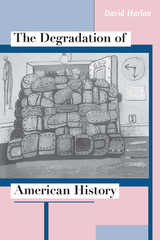
Part One, "The Legacy of the Sixties," describes the impact of literary theory in the 1970s and beyond, the rise of women's history, the various forms of ideological analysis developed by historians on the left, and the crippling obsession with professionalism in the 1980s. Part Two, "The Renewal of American Historical Writing," focuses on the contributions of John Patrick Diggins, Hayden White, Richard Rorty, Elaine Showalter, Henry Louis Gates Jr., and others. Harlan argues that at the end of the twentieth century American historical writing is perfectly poised to become what it once was: not one of the social sciences in historical costume, but a form of moral reflection that speaks to all Americans.
"[A] wholly admirable work. This book will be talked about for years."—Library Journal
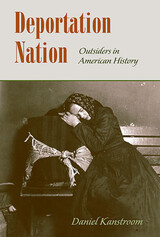
The danger of deportation hangs over the head of virtually every noncitizen in the United States. In the complexities and inconsistencies of immigration law, one can find a reason to deport almost any noncitizen at almost any time. In recent years, the system has been used with unprecedented vigor against millions of deportees.
We are a nation of immigrants--but which ones do we want, and what do we do with those that we don't? These questions have troubled American law and politics since colonial times.
Deportation Nation is a chilling history of communal self-idealization and self-protection. The post-Revolutionary Alien and Sedition Laws, the Fugitive Slave laws, the Indian "removals," the Chinese Exclusion Act, the Palmer Raids, the internment of the Japanese Americans--all sought to remove those whose origins suggested they could never become "true" Americans. And for more than a century, millions of Mexicans have conveniently served as cheap labor, crossing a border that was not official until the early twentieth century and being sent back across it when they became a burden.
By illuminating the shadowy corners of American history, Daniel Kanstroom shows that deportation has long been a legal tool to control immigrants' lives and is used with increasing crudeness in a globalized but xenophobic world.
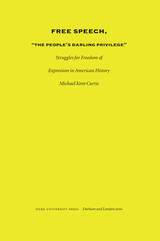
Curtis analyzes three crucial political struggles: the controversy that surrounded the 1798 Sedition Act, which raised the question of whether criticism of elected officials would be protected speech; the battle against slavery, which raised the question of whether Americans would be free to criticize a great moral, social, and political evil; and the controversy over anti-war speech during the Civil War. Many speech issues raised by these controversies were ultimately decided outside the judicial arena—in Congress, in state legislatures, and, perhaps most importantly, in public discussion and debate. Curtis maintains that modern proposals for changing free speech doctrine can usefully be examined in the light of this often ignored history. This broader history shows the crucial effect that politicians, activists, ordinary citizens—and later the courts—have had on the American understanding of free speech.
Filling a gap in legal history, this enlightening, richly researched historical investigation will be valuable for students and scholars of law, U.S. history, and political science, as well as for general readers interested in civil liberties and free speech.
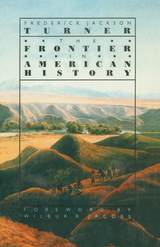

The Harvard Guide has a long and distinguished history in the annals of reference works. First prepared in 1896 by Albert Bushnell Hart and Edward Channing, it was a unique scholarly tool. Revised in 1912 by Hart, Channing, and Frederick Jackson Turner, the Guide carried its entries through 1910 and became the standard text.
In 1954 the Harvard Guide to American History appeared, prepared and edited by members of the History Department of Harvard: Oscar Handlin, Arthur Meier Schlesinger, Samuel Eliot Morison, Frederick Merk, Arthur Meier Schlesinger, Jr., and Paul Herman Buck. A one-volume compendium, the Guide became a classic in historical studies and won a place in every important library—both public and private—of American history.
With its revised republication in 1974, Frank Freidel and Richard K. Showman have made the Guide the most essential reference book for historians. Their work was sponsored by the Charles Warren Center for Studies in American History at Harvard. This thoroughly revised, comprehensive guide to American history reflects the explosive growth in historical publications and materials, and the expanding interests of American historians. About one third of the entries are new. These not only represent the surge of books and articles, but also reflect new areas of history. The brief topical sections in the last edition have grown into a 300-page coverage of economic, social, and intellectual history. Demography, social structure, ethnicity, and the new urban and cultural dimensions of history find a place. Colonial history receives both topical and chronological treatment in an all-inclusive section. United States history since 1759, primarily political and diplomatic, appears in the familiar chronological form.
Enlarged and up-to-date sections cover research methods and material. There are practical suggestions on research, writing, and publication, and extensive citation of finding aids and bibliographies to introduce the user to collections of printed materials, public documents, microform, manuscripts, and archives. The section on care and editing of manuscripts, long standard on the subject, appears unchanged; other sections, such as those on automated data retrieval, quantitative techniques, and oral history, reflect innovations in the historian’s craft. The new Guide has been recast in columnar form to make it easier to locate references and includes cross-reference by pages and sections to facilitate faster use.
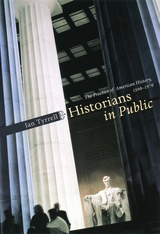
Tyrrell's elegant history of the practice of American history traces debates, beginning shortly after the profession's emergence in American academia, about history's role in school curricula. He also examines the use of historians in and by the government and whether historians should utilize mass media such as film and radio to influence the general public. As Historians in Public shows, the utility of history is a distinctive theme throughout the history of the discipline, as is the attempt to be responsive to public issues among pressure groups.
A superb examination of the practice of American history since the turn of the century, Historians in Public uncovers the often tangled ways history-makers make history-both as artisans and as actors.

Immigration and American History was first published in 1961. Minnesota Archive Editions uses digital technology to make long-unavailable books once again accessible, and are published unaltered from the original University of Minnesota Press editions.
Ten scholars noted for their studies in immigration history contribute essays to this volume. Dr. Commager surveys the course of immigration studies over the years. Oscar Handlin reappraises the role of immigration in American life. Ingrid Semmingsen, Norwegian historian, writes on the image of American in Europe. Philip D. Jordan focuses on the immigrant's view of America. John T. Flanagan discusses the immigrant in fiction. Carlton C. Qualey contributes two essays. In the first he surveys world population movements and in the second he suggests new source materials for immigration studies. Henry A. Pochmann discusses the migration of ideas—what ideas have come into America, from where, and to what end? Franklin D. Scott inquires into the value of immigration studies of nationality groups. The Reverend Colman J. Barry explores possibilities for future immigration studies. Theodore C. Blegen takes a backward glance and a forward look at immigration studies.
The volume is based on the papers given at a conference held at the University of Minnesota in honor of Dr. Blegen on his retirement from the university.
“The supreme American theologian of the twentieth century.”—Arthur Schlesinger Jr., New York Times
“Niebuhr is important for the left today precisely because he warned about America’s tendency—including the left’s tendency—to do bad things in the name of idealism. His thought offers a much better understanding of where the Bush administration went wrong in Iraq.”—Kevin Mattson, The Good Society
“Irony provides the master key to understanding the myths and delusions that underpin American statecraft. . . . The most important book ever written on US foreign policy.”—Andrew J. Bacevich, from the Introduction
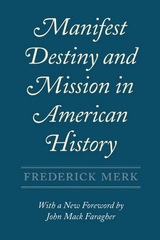
Before this book first appeared in 1963, most historians wrote as if the continental expansion of the United States were inevitable. “What is most impressive,” Henry Steele Commager and Richard Morris declared in 1956, “is the ease, the simplicity, and seeming inevitability of the whole process.” The notion of inevitability, however, is perhaps only a secular variation on the theme of the expansionist editor John L. O’Sullivan, who in 1845 coined one of the most famous phrases in American history when he wrote of “our manifest destiny to overspread the continent allotted by Providence for the free development of our yearly multiplying millions.” Frederick Merk rejected inevitability in favor of a more contingent interpretation of American expansionism in the 1840s. As his student Henry May later recalled, Merk “loved to get the facts straight.”
—From the Foreword by John Mack Faragher

Modern Motherhood travels through redefinitions of motherhood over time, as mothers encountered a growing cadre of medical and psychological experts, increased their labor force participation, gained the right to vote, agitated for more resources to perform their maternal duties, and demonstrated their vast resourcefulness in providing for and nurturing their families. Navigating rigid gender role prescriptions and a crescendo of mother-blame by the middle of the twentieth century, mothers continued to innovate new ways to combine labor force participation and domestic responsibilities. By the 1960s, they were poised to challenge male expertise, in areas ranging from welfare and abortion rights to childbirth practices and the confinement of women to maternal roles. In the twenty-first century, Americans continue to struggle with maternal contradictions, as we pit an idealized role for mothers in children’s development against the social and economic realities of privatized caregiving, a paltry public policy structure, and mothers’ extensive employment outside the home.
Building on decades of scholarship and spanning a wide range of topics, Vandenberg-Daves tells an inclusive tale of African American, Native American, Asian American, working class, rural, and other hitherto ignored families, exploring sources ranging from sermons, medical advice, diaries and letters to the speeches of impassioned maternal activists. Chapter topics include: inventing a new role for mothers; contradictions of moral motherhood; medicalizing the maternal body; science, expertise, and advice to mothers; uplifting and controlling mothers; modern reproduction; mothers’ resilience and adaptation; the middle-class wife and mother; mother power and mother angst; and mothers’ changing lives and continuous caregiving. While the discussion has been part of all eras of American history, the discussion of the meaning of modern motherhood is far from over.

Combining original historical research with interdisciplinary perspectives and informed by the work of Indigenous food sovereignty advocates and activists, this study sheds new light on the historical roles of Native American cuisine in American history and the significance of ongoing colonial processes in present-day discussions about the place of Native foods and Native history in our evolving worlds of taste, justice, and politics.
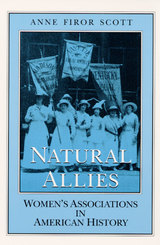

More and more scholars are turning to cultural history in order to make sense of the American past. This volume brings together nine original essays by some leading practitioners in the field. The essays aim to exhibit the promise of a cultural approach to understanding the range of American experiences from the seventeenth century to the present.
Expanding on the editors' pathbreaking The Culture of Consumption, the contributors to this volume argue for a cultural history that attends closely to language and textuality without losing sight of broad configurations of power that social and political history at its best has always stressed. The authors here freshly examine crucial topics in both private and public life. Taken together, the essays shed new light on the power of culture in the lives of Americans past and present.
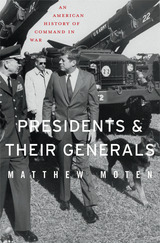
Since World War II, the United States has been engaged in near-constant military conflict abroad, often with ill-defined objectives, ineffectual strategy, and uncertain benefits. In this era of limited congressional oversight and “wars of choice,” the executive and the armed services have shared the primary responsibility for making war. The negotiations between presidents and their generals thus grow ever more significant, and understanding them becomes essential.
Matthew Moten traces a sweeping history of the evolving roles of civilian and military leaders in conducting war, demonstrating how war strategy and national security policy shifted as political and military institutions developed, and how they were shaped by leaders’ personalities. Early presidents established the principle of military subordination to civil government, and from the Civil War to World War II the president’s role as commander-in-chief solidified, with an increasingly professionalized military offering its counsel. But General Douglas MacArthur’s insubordination to President Harry Truman during the Korean War put political-military tensions on public view. Subsequent presidents selected generals who would ally themselves with administration priorities. Military commanders in Vietnam, Iraq, and Afghanistan did just that—and the results were poorly conceived policy and badly executed strategy.
The most effective historical collaborations between presidents and their generals were built on mutual respect for military expertise and civilian authority, and a willingness to negotiate with candor and competence. Upon these foundations, future soldiers and statesmen can ensure effective decision-making in the event of war and bring us closer to the possibility of peace.

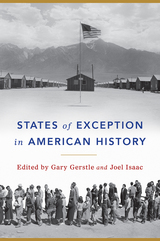
The first comprehensive account of the politics of exceptions and emergencies in the history of the United States, this book weaves together historical studies of moments and spaces of exception with conceptual analyses of emergency, the state of exception, sovereignty, and dictatorship. The Civil War, the Great Depression, and the Cold War figure prominently in the essays; so do Francis Lieber, Frederick Douglass, John Dewey, Clinton Rossiter, and others who explored whether it was possible for the United States to survive states of emergency without losing its democratic way. States of Exception combines political theory and the history of political thought with histories of race and political institutions. It is both inspired by and illuminating of the American experience with constitutional rule in the age of terror and Trump.

Emphasizing a societal context for technology, this carefully organized collection demonstrates both the manner in which cultural, political, and economic forces shape innovation, and the ways that technology has influenced society and shaped its values. Individual essays explore the importance of textile manufacturing in American industrialization, the role of the federal government in regulating new modes of transport, the development of interchangeable parts in production, the process of innovation, the notion of technological systems, and the relationship between technological change and work in the factory, on the farm, and in the home.
The essays were selected to be accessible to both the general reader and the undergraduate student.
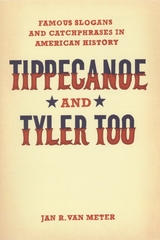
“By necessity, by proclivity, by delight,” Ralph Waldo Emerson said in 1876, “we all quote.” But often the phrases that fall most readily from our collective lips—like “fire when ready,” “speak softly and carry a big stick,” or “nice guys finish last”—are those whose origins and true meanings we have ceased to consider. Restoring three-dimensionality to more than fifty of these American sayings, Tippecanoe and Tyler Too turns clichés back into history by telling the life stories of the words that have served as our most powerful battle cries, rallying points, laments, and inspirations.
In individual entries on slogans and catchphrases from the early seventeenth to the late twentieth century, Jan Van Meter reveals that each one is a living, malleable entity that has profoundly shaped and continues to influence our public culture. From John Winthrop’s “We shall be as a city upon a hill” and the 1840 Log Cabin Campaign’s “Tippecanoe and Tyler Too” to Martin Luther King Jr.’s “I have a dream” and Ronald Reagan’s “Mr. Gorbachev, tear down this wall,” each of Van Meter’s selections emerges as a memory device for a larger political or cultural story. Taken together in Van Meter’s able hands, these famous slogans and catchphrases give voice to our common history even as we argue about where it should lead us.
“As Van Meter argues, these are important ‘memory devices for a larger story.’ . . . The author has thoroughly researched all the catchphrases . . . . This book would make delightful in-flight reading or a nice gift for a trivia buff. Recommended.”—Choice
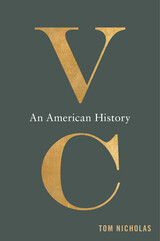
“An incisive history of the venture-capital industry.”
—New Yorker
“An excellent and original economic history of venture capital.”
—Tyler Cowen, Marginal Revolution
“A detailed, fact-filled account of America’s most celebrated moneymen.”
—New Republic
“Extremely interesting, readable, and informative…Tom Nicholas tells you most everything you ever wanted to know about the history of venture capital, from the financing of the whaling industry to the present multibillion-dollar venture funds.”
—Arthur Rock
“In principle, venture capital is where the ordinarily conservative, cynical domain of big money touches dreamy, long-shot enterprise. In practice, it has become the distinguishing big-business engine of our time…[A] first-rate history.”
—New Yorker
VC tells the riveting story of how the venture capital industry arose from America’s longstanding identification with entrepreneurship and risk-taking. Whether the venture is a whaling voyage setting sail from New Bedford or the latest Silicon Valley startup, VC is a state of mind as much as a way of doing business, exemplified by an appetite for seeking extreme financial rewards, a tolerance for failure and experimentation, and a faith in the promise of innovation to generate new wealth.
Tom Nicholas’s authoritative history takes us on a roller coaster of entrepreneurial successes and setbacks. It describes how iconic firms like Kleiner Perkins and Sequoia invested in Genentech and Apple even as it tells the larger story of VC’s birth and evolution, revealing along the way why venture capital is such a quintessentially American institution—one that has proven difficult to recreate elsewhere.
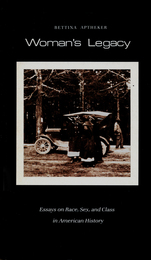
READERS
Browse our collection.
PUBLISHERS
See BiblioVault's publisher services.
STUDENT SERVICES
Files for college accessibility offices.
UChicago Accessibility Resources
home | accessibility | search | about | contact us
BiblioVault ® 2001 - 2024
The University of Chicago Press









